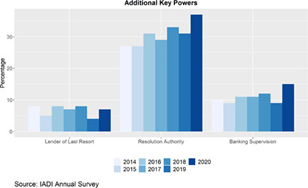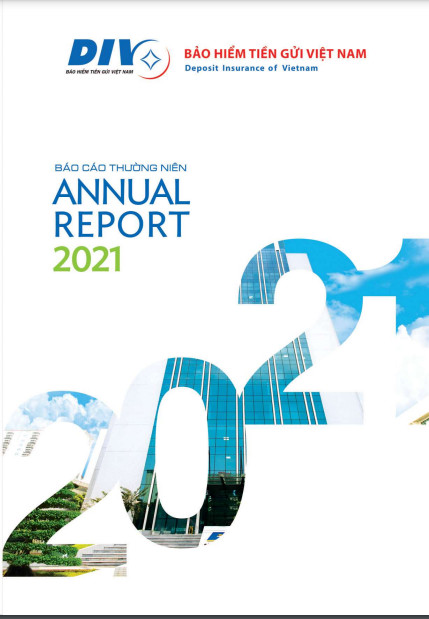Amend regulations on deposit insurance premium mechanism to align with the practical conditions and financial capacity of the credit institution system in each period
Although the 2012 Law on Deposit Insurance provides a framework for a risk-based premium mechanism that evaluates and classifies insured institutions, implementation has been stalled due to difficulties in the process of the evaluation and classification of insured institutions, criteria for determining premium frameworks, premium levels, etc. and conditions on the economic situation, health, and safety of the Vietnamese banking system for application.
While premium collection based on the assessment and classification of insured institutions is not yet implemented, premium collection for insured institutions is still carried out in accordance with current legal regulations. Specifically, according to Clause 3, Article 21 of Decree No.68/2013/ND-CP (Decree 68), the deposit insurance premium, along with regulations related to the amount of insurance paid, continues to be applied according to the provisions stipulated in Decree No. 89/1999/ND-CP issued on September 1, 1999, on deposit insurance (Decree 89) and Decree No. 109/2005/ND-CP issued on August 24, 2005, which amends and supplements a number of provisions of Decree No. 89/1999/ND-CP. Therefore, the premium currently applied to all insured institutions is 0.15%/year, calculated on the average deposit balance of individuals at the organization. This current regulation aims to maintain the stability of the deposit insurance system while waiting for new policies to be issued while ensuring the rights of depositors.
The current situation in Vietnam does not meet the conditions to apply a differentiated deposit insurance premium mechanism; specifically, The Law on Deposit Insurance and sub-law documents do not have specific regulations on the implementing unit, information used, methods, methods, and criteria for evaluating and classifying deposit insurance organizations. DIV (if assigned to evaluate and classify insured institutions) also does not have enough authority to request inspection and verification of information and data; and does not have enough resources to serve the evaluation and classification of organizations. In addition, the banking system is in the process of restructuring, gradually improving management capacity, financial capacity, and risk management towards safety, soundness, and information transparency.
Suppose we continue to maintain the regulations on the differential deposit insurance premium mechanism as in the 2012 Law on Deposit Insurance. In that case, it will not be able to resolve the difficulties and problems that have arisen in the past, and at the same time, it will lead to difficulties in implementing the deposit insurance premium policy in accordance with the nature and characteristics of the credit institution system in Vietnam in particular and the general economic and social situation in each period.
Therefore, in order for the premium collection to comply with legal regulations and be consistent with the current situation in Vietnam, it is necessary to consider amending the regulations on deposit insurance premiums to ensure flexibility in applying the deposit insurance premiums mechanism based on the capacity of the insured institutions, the implementation of the operations of the credit institution and the economic situation, the level of health and safety of the Vietnamese banking system.
Clarifying the responsibility of insured institutions in calculating deposit insurance premiums
The current law does not stipulate the responsibility of calculating deposit insurance premiums for the insured institutions. With such regulations, the calculation and collection of deposit insurance premiums are the responsibility of the DIV. This causes many shortcomings in the procedural process and prolongs the premium collection period, which does not ensure the principle of timely deposit insurance premium collection at the beginning of the quarter, specifically as follows: The insured institutions must send information on insured deposits to DIV. Based on that data, the DIV calculates and notifies the deposit insurance premium amount to be paid to the insured institutions. After receiving the notification from the DIV, the insured institutions will proceed to pay the premium. This is an inefficient process and a problem that needs to be resolved soon.
In fact, to ensure timely collection of premiums at the beginning of the quarter, insured institutions base on information on insured deposits at their own organizations to calculate and pay premiums to the Deposit Insurance of Vietnam. From there, DIV collects premiums and periodically checks the accuracy of the amount of premiums payable by the insured institutions and handles excess or shortage of DIV premiums according to the law. This process has been applied since DIV's establishment and has proven its effectiveness.
Adding provisions for premium payment deferral to support financially distressed institutions
The policy of exempting deposit insurance premiums is a support mechanism applied to credit institutions facing serious financial difficulties and placed under special control as stipulated in Clause 3, Article 166 of the Law on Credit Institutions 2024. The objective of this policy is to reduce the financial burden on weak credit institutions, helping them have more resources to restructure and restore operations. However, exempting deposit insurance premiums for credit institutions under special control contradicts the regulations on risk-based premiums in the Law on Deposit Insurance, which means that credit institutions with high risks must pay higher premiums.
The implementation of the policy of exempting deposit insurance premiums for credit institutions under special control shows that the lack of regulations on deferring deposit insurance premiums will lead to increased financial pressure and will not support credit institutions facing difficulties. Specifically, the insured institution that still owes the deposit insurance premium before being exempted from paying the premium must pay a penalty for not paying the premium. This penalty amount will continue to increase over time, increasing the financial burden on the organizations that still owe the premium. Thus, this will be counterproductive to the goal of reducing the financial burden of the premium exemption policy for the insured institution under special control.
The addition of regulations on deferring the payment of deposit insurance premiums ensures the basis for supporting the insured institution that is facing difficulties in reducing the financial burden while not having to pay a penalty for underpayment or late payment of deposit insurance premiums. These institutions are only allowed to defer the premium payment; when the special control is terminated, and they return to normal operations, these organizations will be responsible for fully paying the suspended deposit insurance premium.
Introducing provisions for raising deposit insurance premiums to offset special loans from the SBV
Currently, according to the provisions of the Law on Credit Institutions 2024, the insured institution must develop a plan to increase deposit insurance premiums to compensate for the State Bank's special loans. However, this content has not been regulated in the Law on Deposit Insurance, which leads to a lack of policy consistency between legal regulations.
If this issue is not resolved soon, it will create a lack of consistency between the Law on Deposit Insurance and the Law on Credit Institutions 2024; there are not enough regulations in the Law on Deposit Insurance as well as documents guiding the Law on Deposit Insurance to be able to implement. Therefore, it is necessary to study and supplement regulations on increasing deposit insurance premiums for the DIV to compensate for the special loans of the State Bank.
Introducing provisions for initial premium payments by newly established insured institutions
The 2012 Law on Deposit Insurance does not yet regulate the payment of premiums for newly established insured institutions that have been granted certificates of deposit insurance participation, so there is no solid legal basis. Meanwhile, there have been cases where newly established insured institutions are obliged to pay insurance premiums. Thus, it is necessary to supplement regulations on payment of the first period of premiums to create a solid legal basis for the implementation and management of premiums for insured institutions.
The implementation of the 2012 Law on Deposit Insurance to date shows that the amendment and supplementation of the Law on Deposit Insurance in general and the adjustment and improvement of policies on social insurance premiums, in particular, are urgent requirements to meet practical needs as well as to be consistent with current legal regulations. The proposals to improve the deposit insurance premium policy are expected to contribute to improving the operational efficiency of the insured institutions so that the deposit insurance policy is truly effective, contributing to maintaining the stability of the credit institution system and ensuring the safe and healthy development of banking activities.
Communication Department



























